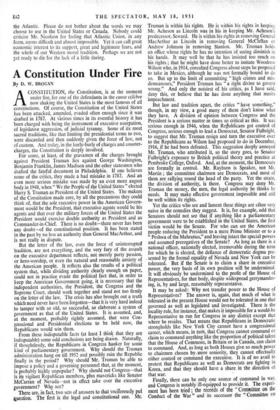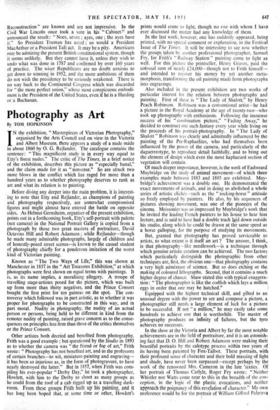A Constitution Under Fire
By D. W. BROGAN ACONSTITUTION, the Constitution, is at the moment under fire, for one of the defendants in the cause celebre now shaking the United States is the most famous of all constitutions. Of course, the Constitution of the United States has been attacked, amended, evaded often enough since it was drafted in 1787. At various times in its eventful history it has been charged with being the instrument of executive usurpation, of legislative aggression, of judicial tyranny. Some of its most sacred traditions, like that limiting the presidential terms to two, were discarded and then suddenly given the force of law, not of custom. And today, in the hurly-burly of charges and counter- charges, the Constitution is deeply involved.
For some, at least, of the gravamen of the charges brought against President Truman lies against George Washington, Benjamin Franklin,James Madison and the other statesmen who drafted the fateful document in Philadelphia. If one believes some of the critics, they made a bad mistake in 1787. And an even more serious mistake was made by an even more august body in 1948, when " We the People of the United States " elected Harry S. Truman as President of the United States. The makers of the Constitution made sure, by all the precautions they could think of, that the sole executive power in the American Govern- ment would be the President. that executive agents would be his agents and that over the military forces of the United States the President would exercise double authority as President and as Commander-in-Chief. There is no doubt—there never has been any doubt—of the constitutional position. It has been stated in the past by no less an authority than General MacArthur, and is not really in dispute. But the letter of the law, even the force of uninterrupted tradition, are not everything, and the very fury of the assault on the executive department reflects. not merely party passion, or hero-worship, or even the natural and reasonable anxiety of the American people. It reflects also the results of a political system that, while dividing authority clearly enough on paper, could not in practice evade the political fact that, in order to keep the American Government going, it is necessary that the independent authorities, the President, the Congress and the Supreme Court. should work together and stand not too firmly on the letter of the law. The crisis has also brought out a truth which need never have been forgotten—that it is very hard indeed to tamper with so old, so successful, so elaborate a system of government as that of the United States. It is assumed, and. at the moment, probably rightly assumed, that were Con- gressional and Presidential elections to be held now, the Republicans would win them. From these indisputable facts (at least I think that they are indisputable) some odd conclusions are being drawn. Naturally, if thoughtlessly, the Republicans in Congress hanker for some kind of parliamentary government. Why should the Truman administration hang on till 1952 and possibly ruin the Republic finally in the period? Why should Mr. Truman be able to impose a policy and a governing personnel that, at the moment. is probably highly unpopular? Why should not Congress—that is its vigilant Republican members, plus mavericks like Senator McCarran of Nevada—not in effect take over the executive government? Why not? There are, in fact, two sets of answers to that vociferously put question. The first is the legal and constitutional one. Mr. Truman is within his rights. He is within his rights in keeping Mr. Acheson as Lincoln was in his in keeping Mr. Acheson's predecessor. Seward. He is within his rights in removing General MacArthur as Lincoln in removing General McClellan or Andrew Johnson in removing Stanton. Mr. Truman holds an office whose rights he has no intention of seeing diminish in his hands. It may well be that he has insisted too much on his rights that he might have done better to imitate Woodrow Wilson who, in 1914, consulted Congress about steps he proposed to take in Mexico, although he was not formally bound to do so. But up to the limit of committing " high crimes and mis- demeanours," President Truman has " a right divine to govern wrong." And only the noisiest of his critics, as I have said, deny this, or believe that he has done anything that merits impeachment.
But law and tradition apart, the critics " have something." though, in my view, a good many of them don't knbw what they have. A division of opinion between Congress and the President is a serious matter in times so critical as this. It was serious enough in 1946, when the Republicans got control of Congress, serious enough to lead a Democrat, Senator Fulbright, to suggest that Mr. Truman resign and turn the executive over to the Republicans as Wilson had proposed to do in December, 1916, if he had been defeated. This suggestion deeply annoyed Mr. Truman, who attributed it, so the story goes, to Senator Fulbright's exposure to British political theory and practice at Pembroke College, Oxford. And, at the moment, the Democrats are formally in control. Mr. Rayburn is Speaker, not Mr. Martin the committee chairmen are Democrats, and most of them are rallying round the head of the party. Yet the strain, the division of authority, is there. Congress may deny Mr. Truman the money, the men, the legal authority he thinks he needs. It may make effective government impossible and still be well within its rights.
Yet the critics who see and lament these things are often very naive in the remedies they suggest. It is, for example, odd that Senators should not see that if anything like a parliamentary government were to be established in the United States, the first victim would be the Senate. For who can see the American people reducing the President to a mere Prime Minister or to a Peshwa of the Mahrattas." and leaving intact the special powers and assumed prerogatives of the Senate? As long as there is a national officer, nationally elected, irremovable during the term for which he is elected, the defiance of democratic dogma pre- sented by the formal equality of Nevada and New York can be tolerated. But if the Senate is to claim a share in executive power, the very basis of its own position will be undermined. It will obviously be undermined to the profit of the House of Representatives, for that body, despite widespread gerrymander- ing, is, by and large, reasonably representative.
It may be asked: Why not transfer power to the House of Representatives? The answer is, again, that much of what is tolerated in the present House would not be tolerated in one that governed as well as legislated and investigated. There is the locality rule, for instance, that makes it impossible for a would-be Representative to run for Congress in any district except that where he resides. That means that Republicans in Democratic strongholds like New York City cannot have a congressional career, which means, in turn, that Congress cannot command or claim to command anything like the proportion of political talent that the House of Commons, in Britain or in Canada, can claim to command. And, as long as both Houses give so much power to chairmen chosen by Anere seniority, they cannot effectually either control or command the executive. It is of no avail to protest that Republicans as well as Democrats are fighting in Korea, and that they should have a share in the direction of that war.
Finally, there can be only one source of command in war, and Congress is notably ill-equipped to provide it. The experi- ment has been tried the records of the " Committee on tbc Conduct of the War" and its successor the "Committee on Reconstruction " are known and are not impressive. In the Civil War Lincoln once took a vote in his " Cabinet!' and announced the result: " Noes, seven ; ayes, one ; the ayes have it." So President Truman has acted ; so would a President MacArthur or a President Taft act. It may be a pity. Americans may be admiring the present British constitutional system, though it seems unlikely. But they cannot have it, unless they wish to undo what was done in 1787 and confirmed by over 160 years of practice. The wiser Republicans are no doubt anxious to get down to winning in 1952, and the more ambitious of them do not wish the presidency to be seriously weakened. There is no way back to the Continental Congress which was discarded for " the more perfect union," whose most conspicuous embodi- ment is the President of the United States, even if he is a Harding or a Buchanan.







































 Previous page
Previous page